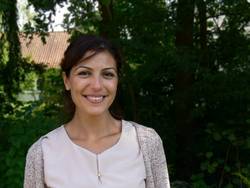Group Leader

Prof. Dr. Hassan Y. Naim
Hassan Y. Naim received his Ph.D. Degree in biochemistry from the University of Bern, Switzerland. After positions at the Institute of Biochemistry at the University of Lausanne (membrane transport in T cells) and the Children's Clinic at the University of Bern (structure and function of brush border membrane proteins), he moved to the Department of Biochemistry, University of Texas, Southwestern Medical Center in Dallas, USA, in 1989 to continue work on the structure-function relationships, protein and membrane transport of intestinal brush border proteins. In 1991 he was hired as a junior research group leader within the framework of the "Biocatalysis" focus at the University of Düsseldorf, Germany. In 1997 he was appointed professor and head of the Institute for Physiological Chemistry at the University of Veterinary Medicine, Hanover, Germany. The research interests of the Naim group focus on the molecular mechanisms underlying protein and membrane transport and polarized protein sorting in epithelial cells in healthy and pathological conditions, in particular on the role of lipid rafts and glycosylation. These questions are addressed in (1) genetic malabsorption disorders of carbohydrates in sucrase-isomaltase and lactase deficiency and in irritable bowel syndrome and (2) in lysosomal storage diseases (Niemann-Pick type C and Fabry diseases). More recently, the group has started to investigate the modulatory roles of lipid rafts and glycosylation in the interactions between pathogens and the small intestine on a biochemical and cellular level.
PostDoc
Dr. Abdullah Hoter
PostDoc
Direct dial +49 511 953-8523
Fax +49 511 953-8585

Dr. Dalanda Wanes
PostDoc
Direct dial +49 511 953-8788
Fax +49 511 953-8585

PhD Students
Marianne El Khoury , MSc
PhD Student
Direct dial +49 511 953-8705
Fax +49 511 953-8585
Tammy Stellbrinck, MSc
PhD Student
Direct dial +49 511 953-8523
Fax +49 511 953-8585
Sanaa Mahmoud, MSc
PhD Student
Direct dial +49 511 953-8762
Fax +49 511 953-8585
Stephanie Tannous, MSc
PhD Student
Direct dial +49 511 953-8705
Fax +49 511 953-8585
In Collaboration with Hannover Medical School (MHH)

Hadeel Shammas, PhD
Hannover Medical School (MHH)
shammas.hadeel@mh-hannover.de
CV
Hadeel Shammas received her B.Sc. (Biology) degree from the University of Aleppo in Syria in 2007. She completed the Master's degree in October 2011 with the thesis "The Effect of Drugs Acting in Diverse Neuromechanisms on Locomotor Behavior in Parkinsonian Rats" as part of a collaboration at the Institute of Zoology (Physiology), Faculty of Science and the Faculty of Pharmacology at the University of Aleppo.
Since December 2012, Hadeel has been working as a PhD student at the Institute of Physiological Chemistry, Hannover University of Veterinary Medicine. She is conducting her project "Pathophysiology and possible biomarkers in Niemann-Pick type C disease (NPC) considering membrane function and lipid composition" as part of the PhD program "System Neuroscience" under joint supervision of Prof. Das from Hannover Medical School and Prof. Naim from Hannover Veterinary School.
NPC-Research Project
NPC is a serious neurodegenerative disease that is mainly caused by mutations in the NPC1 gene. In her research, Hadeel uses targeted mutagenesis to generate various mutations in the NPC1 gene and investigates the influence of the mutations on the folding and transport of the NPC1 protein. In addition, the influence of the mutations on lipid rafts and the cellular lipid composition will be investigated, followed by the consequences for intracellular transport and activity of intestinal disaccharidases such as sucrase isomaltase. Results from Hadeel's work may help explain the very varied, especially gastrointestinal, symptoms of NPC patients.


